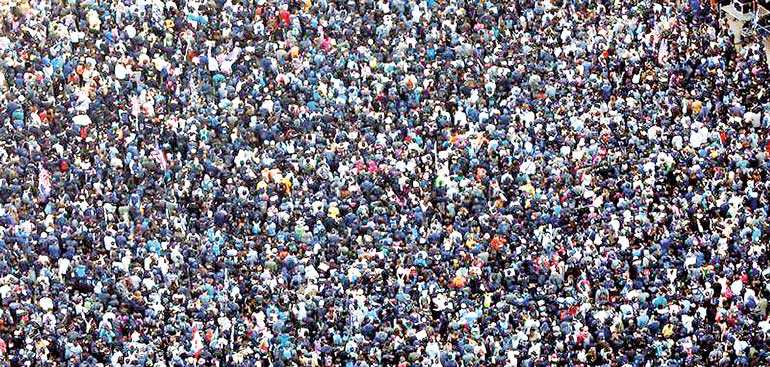Saturday Feb 21, 2026
Saturday Feb 21, 2026
Monday, 9 December 2019 00:17 - - {{hitsCtrl.values.hits}}

HONG KONG (Reuters): Thousands of black-clad protesters from all walks of life gathered in Hong Kong on Sunday under a crisp blue sky for a rally that is expected to gauge support for democracy in the financial hub which has been roiled by protests for six months.
Anti-government activists, young and old, converged in Victoria Park, the starting point of the rally in the bustling shopping district of Causeway Bay before making their way to Chater Road near the heart of the financial district.
Authorities gave the green light to Civil Human Rights Front (CHRF) - organizer of largely peaceful million-strong marches in June – to hold the rally, the first time the group has been granted permission for a protest since Aug. 18.
“I will fight for freedom until I die because I am a Hong Konger,” said June, a 40-year-old mother dressed in black seated on the grass in Victoria Park. “Today is about standing with Hong Kong, and the international community.”
Others chanted, “Fight for Freedom, stand with Hong Kong,” one of the slogans of the anti-government movement.
Police said earlier on Sunday they had arrested 11 people, aged 20 to 63 and seized weapons including army knives, firecrackers, 105 bullets and a semi-automatic pistol, the first seizure of a handgun in six months of protests.
Many demonstrators sat on the grass in Victoria Park waiting for organizers to announce the start of the march scheduled for 3 p.m. (0700 GMT) that will follow the route of similar protests, most of which started out peacefully but later descended into violence.
The protests escalated in June over a now-shelved extradition bill that would have allowed people to be sent to mainland China for trial, but have now evolved into broader calls for democracy, among other demands.
In a statement on Saturday, the government appealed for calm and said it has “learned its lesson and will humbly listen to and accept criticism.”
Hong Kong’s new police commissioner, Chris Tang, said his force would take a flexible approach to demonstrations, using “both the hard and soft approach.”
The former British colony has been rocked by more than 900 demonstrations, processions and public meetings since June, with many ending in violent confrontations between protesters and police, who have responded at times with tear gas and rubber bullets.
Protesters have torched vehicles and buildings, hurled petrol bombs at police stations and trains, dropped debris from bridges onto traffic below and vandalized shopping malls and university campuses, raising questions about how and when the unrest can be brought to an end.
Demonstrators are angry at what they see as the China government’s meddling in freedoms promised to Hong Kong when the then British colony returned to Chinese rule in 1997.
Beijing denies meddling and has condemned the unrest and blamed foreign governments, including the United States and former colonial power Britain, of interfering in the country’s internal affairs.
The chairman and president of the American Chamber of Commerce (AmCham) in Hong Kong were separately denied entry to the neighbouring Chinese-ruled city of Macau on Saturday after being detained by immigration officials.
The international financial hub has enjoyed relative calm since local elections on 24 November delivered an overwhelming victory to pro-democracy candidates.
Nearly 6,000 people have been arrested in the protests since June, more than 30% aged between 21 and 25.